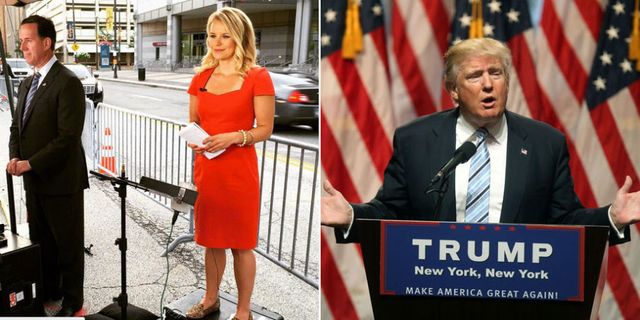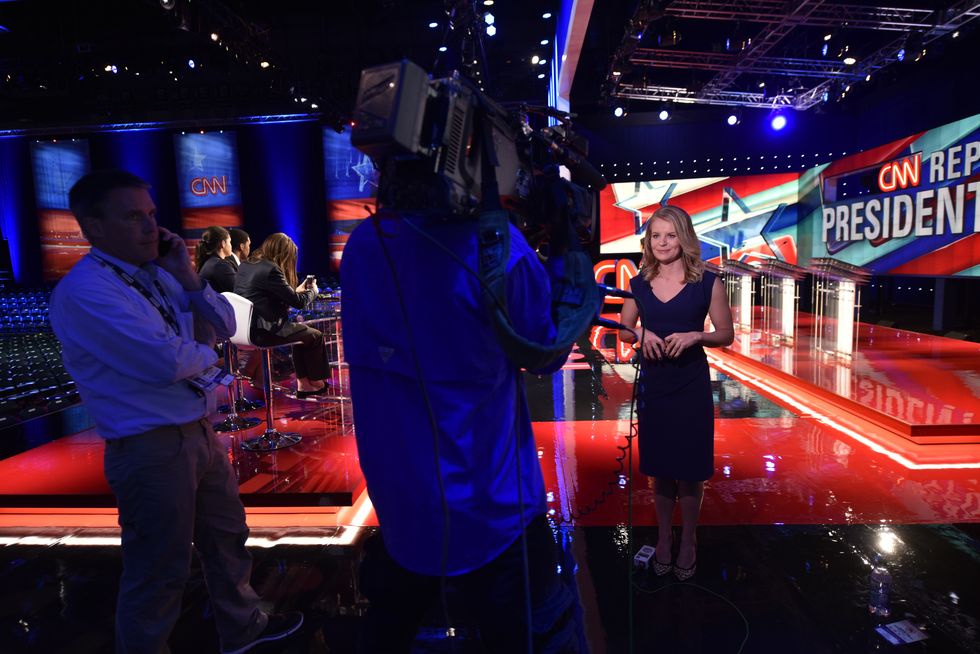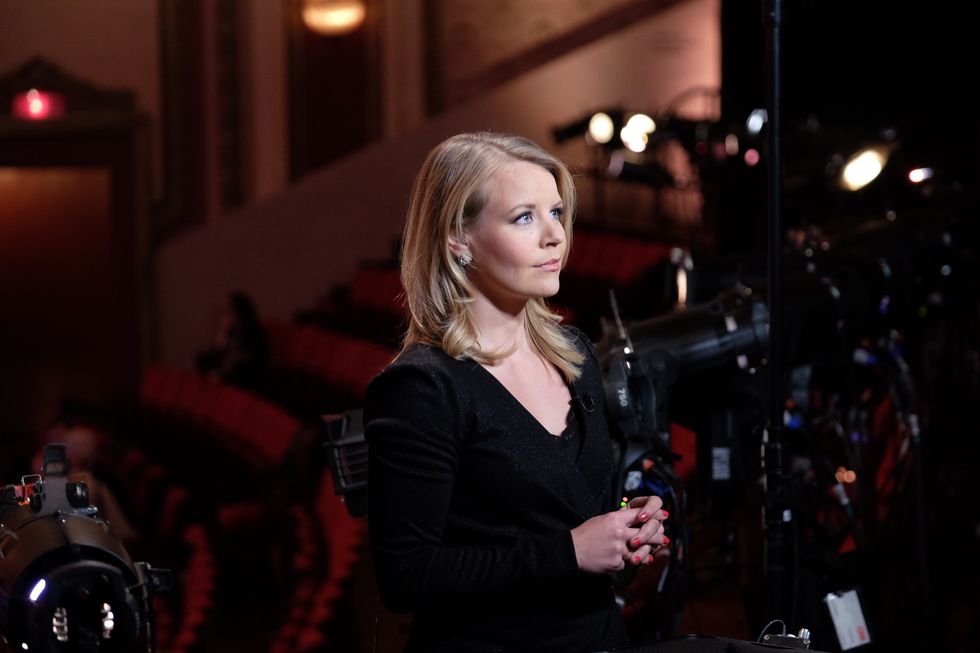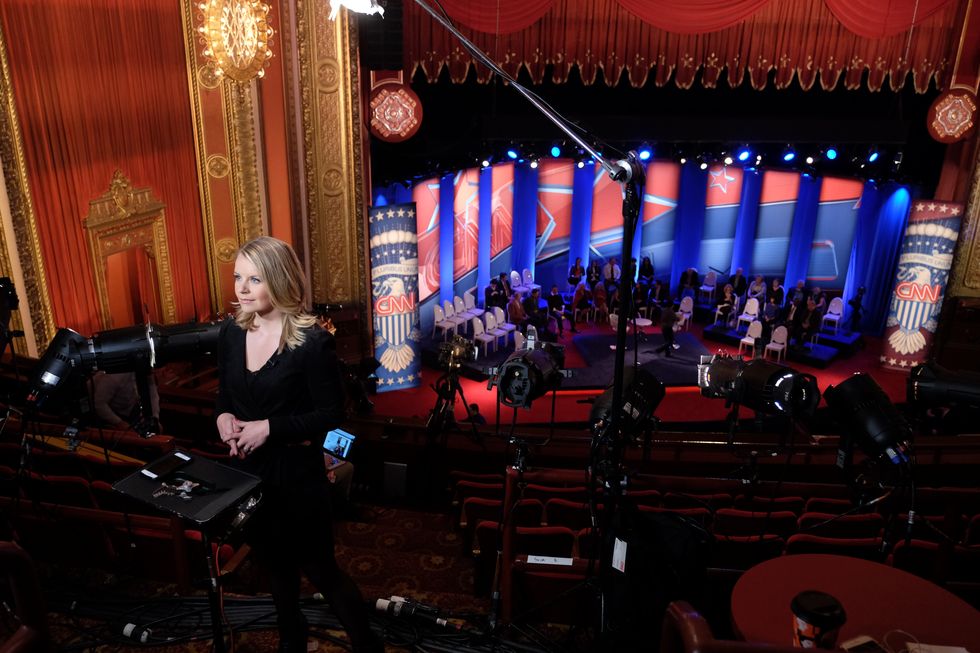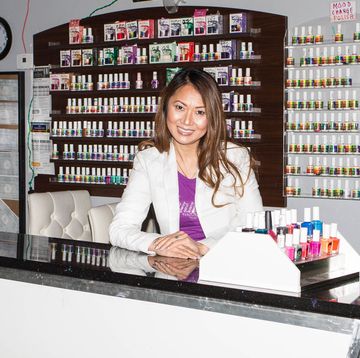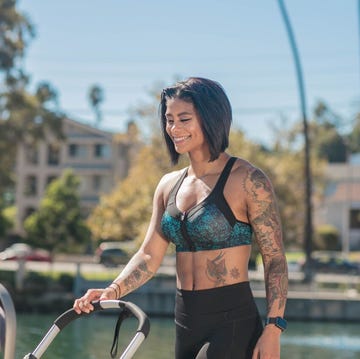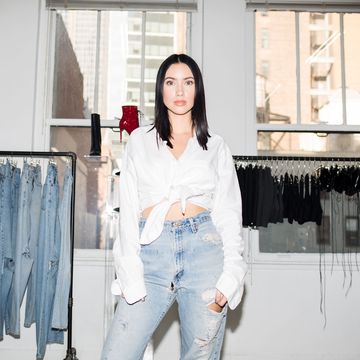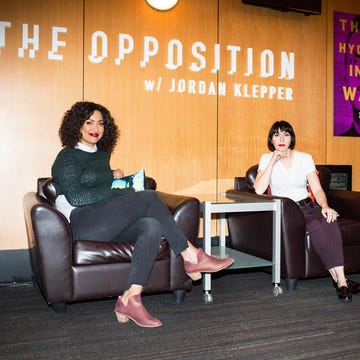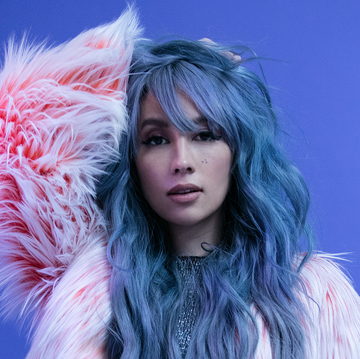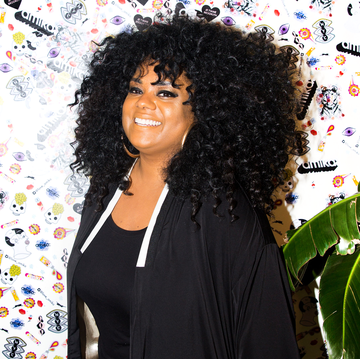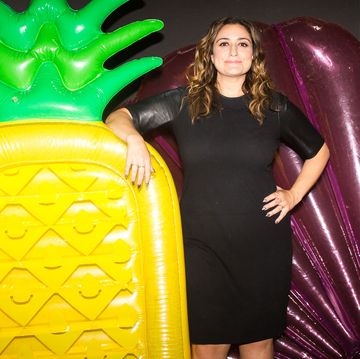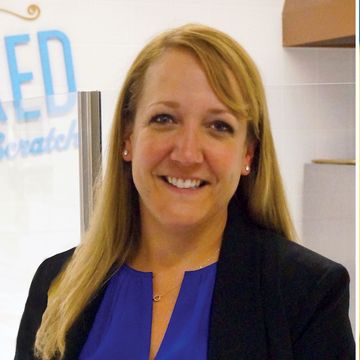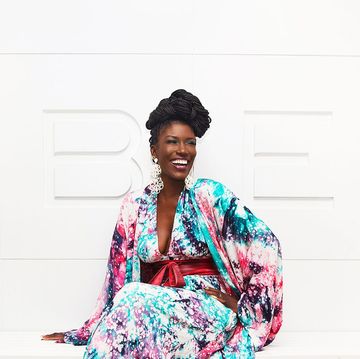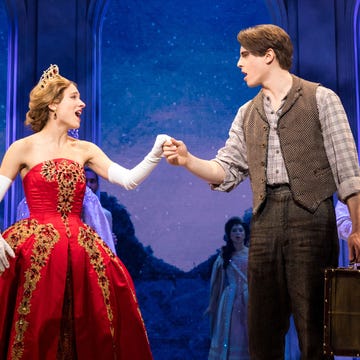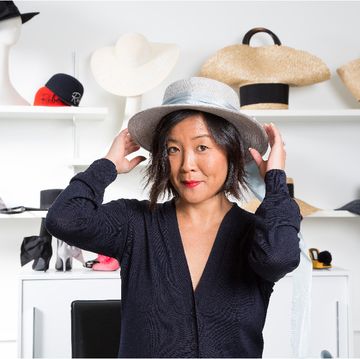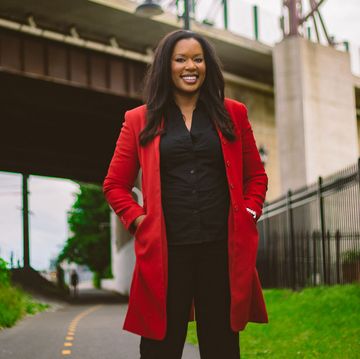Sara Murray landed her dream job at the Wall Street Journal straight out of college. By the time she was 26, Murray was on the campaign trail covering Mitt Romney's 2012 run for the Oval Office. She learned a lot from that experience, but nothing could prepare her for her on-air job at CNN and the assignment to cover Donald Trump.
For the past year Murray, 30, has been the face of CNN's Trump coverage, appearing live on the network's news programs throughout the day. She's up before the sun each morning, chasing the candidate down for interviews and navigating the mayhem that has become commonplace at his campaign events. She's even endured personal attacks from the candidate. The job is nonstop, exhausting, and filled with frustrations — from never being able to find healthy food on the trail to going weeks at a time without seeing her fiancé. But Murray explains why the thrill of the campaign trail makes it all worthwhile.
While I was in college at the University of Maryland, I stalked the recruiter at the Wall Street Journal, begging her to hire me for an internship. I was studying print journalism, and I was interested in financial news and the economy. I got rejected a lot of times.
I went home and cried after my first meeting with this recruiter at a job fair. She told me I needed more experience in hard news and that I had to read the Wall Street Journal religiously if I ever wanted to work there. I applied to, like, 100 internships every summer trying to make my way into bigger markets. I ended up at The Baltimore Sun and at The Arizona Republic. I wrote the recruiter throughout the year and I made it my goal to track her down at that same job fair every year.
When I was graduating in 2008, there was an entry-level job available at the Journal. My bosses told me the recruiter said she was impressed with my persistence and that I took her feedback and used it constructively.
We were in the middle of the financial crisis and a presidential campaign. I was the youngest person in the office, so anytime there was a young voter story, they'd say, "Sara, go interview the college students." I split my time working for the politics and economics editors, covering the financial crisis, reporting on the 2008 campaign, and I started to do online video reports [on these topics] for the paper.
In 2012, I was assigned to cover Mitt Romney's presidential campaign. I was on the road for over a year. Romney rode on the bus or the press plane with the rest of us. We called it being in the bubble. You're with the same people every day. We all start our day going through Secret Service screenings. We're shuttled onto a plane, then onto a bus to a campaign event, then back on the bus to another event that night, then back on the plane, and you end your night in a hotel in a different state.
After the 2012 election, I had been at the Journal for four years. I loved working with them, but I wanted to try out different skill sets. After the election, I stayed in Washington, D.C., for a while to cover Congress, and in 2013, I moved to New York to do more video work for the Journal. When CNN was starting to staff up for the next presidential campaign, I felt like it was a really good fit. It's the kind of place that will let you do everything. If you want to write and break news on the website, you can do that. Then you can go on the air and talk about the story you did on TV. In the spring of 2015, I moved back to D.C. and started work at CNN.
The first time I was on TV, it was extremely nerve-racking. You want to say everything that's in your head, but in reality, you have time to make maybe two or three points. A big thing to learn is how to shut yourself up.
When CNN hired me as a political reporter, the plan was to put me on the Republican candidates because that's what I had covered before. We knew at that point it was probably going to be a pretty big field, but we were still watching to see how it was shaping up. They gave me a bucket of candidates to cover: John Kasich in Ohio, Scott Walker in Wisconsin, Rick Perry in Texas.
At CNN, we had sort of been ignoring Trump. We thought it was going to be a media ploy until it became clear that he was actually going to run. I remember my boss saying to me, "We're going to put you on Trump." And I was like, "You mean part-time, right? I'm still going to be with all these other candidates, right?" And he said, "No, we think Trump is going to be a pretty big story."
When I got the assignment right after he entered the race in June 2015, I remember being personally conflicted. I felt I wasn't going to have enough time to cover the rest of the candidates — who I thought would be in the election a lot longer — the way I wanted to. This was a time when we thought Scott Walker was the guy who was going to win Iowa. We all had the same feeling, which was, Who knows how long this is going to last. At least it will be interesting for a while.
All last summer, people were predicting that it would simmer out and that [Trump] was just the flavor of the month; then it was the flavor of the summer. As the summer ended, you could sense the panic start to rise from the other campaigns. It took a little while for people to realize he was sparking something in the electorate that we didn't expect and hadn't seen.
You have to approach covering the Trump campaign from a totally different perspective. He travels in his own gold-plated plane. The press is separate, chasing him. He flies in, does an event, then flies home to New York at the end of the night. When I covered the previous election, you'd get to know the people on all the different campaigns. Maybe you'd have a couple hours with the advisors at the end of the day. You'd have dinner and drinks at the same restaurants as everyone in the campaign. It made it easier to get sources. Trump had his own people from his company and these new folks who nobody knew.
For the first six months of the campaign, interviews with Trump were less formal. There was a smaller group of media following him, and I would just grab him for a quick comment as he was going into an event. Once he got Secret Service, it became much harder because their entire job is to protect Donald Trump from anyone who might try to harm him in public. They make sure he's now cloaked in his entrances, so you can't just walk up to him and pull him aside anymore.
There's no such thing as a normal schedule, but for instance, if I'm leaving home in D.C., I try to take a flight as early as possible. I wake up at 5 a.m. and I'm on a 7 a.m. flight. My goal as soon as I land in a location is to go for a run or to hit the gym. When I'm driving from the airport, I'll start sending emails and making my first phone calls of the day. Then I check in early to my hotel and shower. Once I'm camera-ready, most people have responded to my emails and I start getting people on the phone. I check in with my editors, I get my assignments, and I start reporting out the story of the day. Then I write my piece for TV, track it [pre-record to air later on TV and the CNN website], then head over to Trump's event, usually a couple of hours before it starts. We are live through the event, and we'll usually be there 'til 10 or 11 p.m. Maybe my producer and I will go get dinner, or if I'm too exhausted, I'll have a glass of wine and crash. And then we do it all over again in the morning.
You never have enough sleep, you never have enough time to work out, and all of the food on the trail is less healthy than you expect it to be. I bring tons of food with me wherever I go because we never know when we're going to be able to eat. I use dry shampoo all week long and then I just blow it dry after the gym and re-curl it. It's just so time consuming to wash and dry my hair, and I'd rather have those extra 15 minutes of sleep.
The hardest part is you don't get to see the most important people in your life for so long. My fiancé and I got engaged over Thanksgiving, and two days later, I was on a plane and I was gone for the next month and a half. This is not usually how people spend the year they get engaged. We're not getting married until April 2017, which was a strategic decision. I have a very understanding fiancé, but sometimes he does ask, "Are you ever coming home?"
Every week, I feel like I'm having this emotional negotiation with myself. I feel guilty when I'm at home because I feel like I should be at work, and I feel guilty when I'm at work because I feel like I should be at home. I'm constantly trying to find some kind of balance between those things.
But it can be so invigorating. When there is breaking news and you're constantly working the phones, emailing people, and trying to get as much information as you can because you're about to go on live television, it's a rush. In the evening, I tend to be really revved up. I feel like I've really accomplished a lot and given people a window into this campaign. And then the alarm goes off the next morning at 5, and I'm like, Why did I not go to bed sooner?
I have friends and family who are Republicans and think Trump has broken a barrier and is entertaining as hell to watch. And there are some people in my life who are Democrats and would never vote for Trump, and they're watching this whole thing in horror. When anyone asks me about my job, most really want to know what Trump is like or if he knows my name.
Before Donald Trump, it was rare for a presidential candidate to be attacking individual reporters. Now that I've been covering him more than a year, this is not a new phenomenon. But I'll never forget the first time it happened to me. It was early in the campaign at an event in South Carolina in November 2015. He was unhappy with some story I had done and he did a little impression of me on stage, and started talking about this terrible CNN reporter. Then he called me out by name. The next thing I knew, I had thousands of Trump fans turning around [and] jeering at me. I don't think I felt unsafe in that moment, but it was extremely uncomfortable. It's not something we were used to seeing from presidential candidates at campaign events. But now, I think any reporter who has asked Trump a tough question has gotten the Trump treatment.
I don't think you can take it personally. A lot of this is Donald Trump adjusting to the scrutiny of running for president, which is far beyond what he's used to. Asking him questions that he might perceive as difficult or uncomfortable is absolutely what you do as a journalist to someone who wants to lead the United States of America. The press is an easy target, but we just get up the next morning and keep asking hard questions. That's the job.
The other thing that there's really no way to prepare for in the transition from print to TV is the level of vitriol you're going to face on Twitter. In some ways, that's just a part of life for all journalists, but superficial critiques seem to be particularly prevalent for women. People on Twitter have mocked the sound of my voice, criticized my weight, and told me my lipstick choice makes me look too old. And that's my kinder, gentler version of their critiques. You really have to be secure in yourself to be able to let those criticisms roll off you day by day.
There's no doubt that the level of protests at a Donald Trump event is far beyond what we're used to seeing. His rhetoric has sparked this kind of divisiveness and that's no secret. During an event in New Orleans before the Louisiana primary — before he ramped up security — there were young protesters fighting back when people tried to kick them out, and the crowd was turning on them. It felt like it could have broken out into total pandemonium at any moment.
I've never left a Donald Trump event feeling worried that someone is going to come get me. But I'm not stupid about it either. I travel with a producer. We're together most of the time. I'm not going to leave an event at 11 p.m. by myself. You take the same kinds of precautions you would if you were a woman alone anywhere.
If I can get a couple hours off, I try to feel normal just by enjoying the setting outside wherever I am if that's an option. I went on a great run in Indianapolis because my hotel overlooked this trail that went into a local park. When we were in Vegas, my producer and I went on a hike. When I was in California, I went on a run along the beach. I'm lucky enough to be seeing so much of the country and I get to do it as my job. When I'm having a bad day on the campaign trail, I'll pull up my hotel points or frequent-flier miles and think, I'm going to take the best vacation after this.
I always like to say I'm going to sleep the day after the campaign ends, but that's not true. I hope to go home and see my fiancé and my dog. But then there's the transition. There is going to be a new president. It's going to be all hands on deck to cover that story no matter who wins. We're all just waiting to see what happens next.
Get That Life is a weekly series that reveals how successful, talented, creative women got to where they are now. Check back each Monday for the latest interview.
Follow Heather on Twitter.
